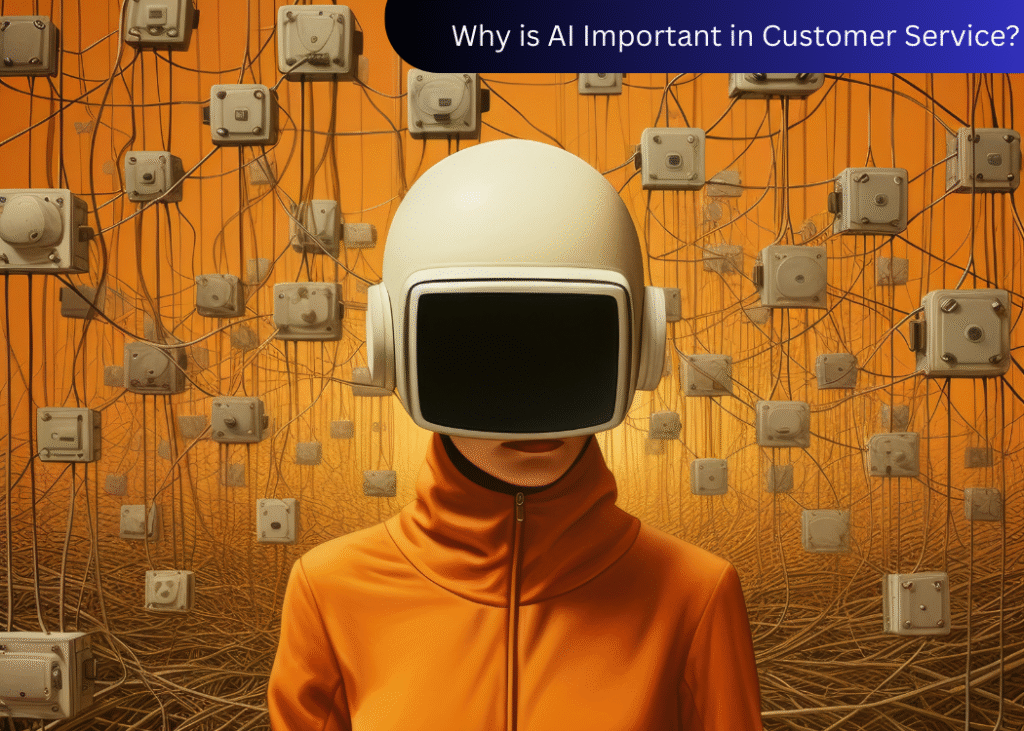Artificial Intelligence has become a core driver of modern customer service transformation. It helps organisations offer faster resolutions, reduce operational burdens, and personalise communication at scale. By analysing customer behaviour, automating repetitive processes, and delivering instant responses, AI enables brands to maintain consistency and accuracy, even during peak demand. As digital expectations rise, AI serves as a strategic asset that enhances service quality, improves loyalty, and supports business growth.
What Is Artificial Intelligence?
Artificial Intelligence refers to technologies capable of learning from data, understanding patterns, and making decisions with minimal manual input. Through machine learning, natural language processing, and predictive analytics, AI enhances accuracy and improves user interactions. In customer service, it automates routine tasks, provides real-time insights, and supports quick decision-making, helping businesses deliver more efficient and personalised support across multiple channels.
Read Also:- ChatGPT vs Gemini vs Copilot: Understanding the Key Differences Between AI Giants.
How AI Is Used in Customer Service
1. Intelligent Chatbots for Instant Assistance
AI chatbots handle common questions such as order updates, refunds, product details, account issues, and troubleshooting. They learn from customer interactions, continuously improving their accuracy.
Benefits: Eliminates long wait times, delivers consistent information, and offers 24×7 availability.
Industries: Retail platforms use them for order queries, banks use them for account support, healthcare uses them for appointment guidance, and food delivery apps rely on them during high-volume hours.
2. AI Driven Virtual Assistants
These voice-based tools allow customers to interact naturally through spoken commands. They assist with bookings, renewals, resetting passwords, and managing account details.
Benefits: Enhances convenience, enables hands-free navigation, and supports visually impaired users.
Industries: Airlines use them for flight schedules, insurance firms for policy inquiries, and financial companies for balance checks and transaction information.
3. Predictive Customer Support
Predictive AI identifies service issues before customers notice them by analysing behaviour, usage patterns, and error signals.
Benefits: Reduces escalations, improves customer satisfaction, and helps businesses resolve issues proactively.
Industries: Telecom companies predict network outages, streaming platforms recommend content, and SaaS providers alert users about potential performance issues.
4. Sentiment Analysis for Better Prioritisation
AI scans messages, reviews, and chats to understand emotions such as frustration, urgency, or satisfaction.
Benefits: Helps support teams prioritise critical cases and respond quickly to negative feedback.
Industries: Hospitality brands use it for online reputation management, e commerce platforms use it for product review analysis, and service companies use it for customer feedback monitoring.
5. Personalised Recommendations
AI personalises customer journeys by suggesting products, services, or solutions based on behaviour, past purchases, demographics, and browsing data.
Benefits: Enhances engagement, increases sales, and improves customer satisfaction.
Industries: E commerce platforms deliver product suggestions, OTT apps recommend shows, and travel companies provide custom holiday packages.
6. Automated Ticketing and Workflow Management
AI automatically categorises requests, assigns tickets to the right teams, and prioritises issues based on urgency and complexity.
Benefits: Reduces manual work, accelerates resolutions, and ensures organised support operations.
Industries: CRM tools, IT service desks, and enterprise support environments use AI to streamline complex workflows.
7. Fraud Detection and Security Enhancement
AI monitors user activity in real time to identify fraud, unusual patterns, or unauthorised access.
Benefits: Prevents financial loss, boosts customer confidence, and enhances overall platform security.
Industries: Digital wallets detect fraudulent transactions, banks track suspicious behaviour, and e commerce sites prevent payment fraud.
8. AI Powered Self Service Portals
AI helps create dynamic knowledge bases, intelligent FAQs, and guided troubleshooting steps.
Benefits: Allows customers to solve problems independently, reducing ticket volume and improving user empowerment.
Industries: Software companies, internet service providers, and telecom brands use AI-based portals to deliver quick solutions.
9. Real Time Language Translation
AI translation tools support multilingual customer interactions through instant text and voice conversion.
Benefits: Removes language barriers, improves clarity, and expands global service reach.
Industries: International hotels, travel agencies, global retail chains, and customer support BPOs use AI to communicate with diverse audiences.
10. Reduced Operational Costs
AI lowers the need for large support teams by automating repetitive tasks and reducing manual interventions.
Benefits: Saves training costs, increases efficiency, and optimises resource distribution.
Industries: Businesses across sectors use AI to scale support without increasing staffing budgets.
11. Scalable High Volume Handling
AI systems can manage thousands of simultaneous interactions with consistent accuracy, even during peak seasons or major campaigns.
Benefits: Prevents slowdowns, maintains service quality, and ensures smooth customer experiences.
Industries: E commerce flash sales, holiday travel bookings, and fintech platforms with high transaction volumes rely on AI for stability.
12. Data Driven Insights for Better Decisions
AI analyses support interactions to detect trends, identify common issues, and suggest improvements.
Benefits: Helps refine customer journeys, enhance product strategies, and optimise marketing efforts.
Industries: SaaS companies use insights to improve product UX, e commerce brands refine return policies, and banks enhance customer journeys.
Where AI Creates the Most Impact
AI significantly enhances:
-
Technical issue resolution with guided diagnostics
-
Order and delivery tracking through predictive updates
-
Multilingual communication for global users
-
Healthcare support with symptom checks and appointment guidance
-
Banking and payments with secure, automated assistance
-
Telecom troubleshooting with real-time network insights
-
Reputation monitoring through automated sentiment tracking
-
Fraud and risk prevention with advanced pattern detection
-
Feedback analysis with AI-driven survey interpretation
Challenges of AI in Customer Service.
1. Limited Emotional Understanding
AI cannot fully identify complex emotions or provide empathy needed in sensitive situations.
2. Difficulty Handling Complex Queries
Highly technical, multi-step, or personalised issues may require human judgment.
3. Workforce Displacement Concerns
Automation may reduce the need for large support teams, requiring new workforce strategies.
4. Privacy and Security Risks
AI systems must safeguard sensitive data from breaches, making cybersecurity a priority.
5. Potential for Bias
If trained on flawed data, AI may deliver inaccurate or unfair results.
6. Overdependence on Technology
System outages or downtimes can interrupt services and affect customer experiences.
7. Integration Challenges
AI needs seamless connectivity with existing CRMs, payment systems, and databases to perform well.
8. High Initial Investment
Developing, training, and maintaining advanced AI tools can be costly for small businesses.

Future Trends of AI in Customer Service
1. Advanced Natural Language Processing
Next-generation AI models will understand context, tone, intent, and sentiment more accurately, creating smoother conversations.
2. Growth of Voice AI Adoption
Voice-based self-service systems will become more common in banks, travel agents, and healthcare for quick navigation and support.
3. Hybrid AI Human Support Models
Companies will integrate AI for routine tasks and humans for emotional or complex issues, ensuring balanced service.
4. Predictive and Preventive Customer Support
AI will anticipate problems like payment failures, subscription lapses, or service outages before they affect users.
5. Unified Omnichannel AI Experiences
AI will synchronise customer history and interactions across apps, websites, emails, and social media for seamless continuity.
6. Rise of Responsible and Ethical AI
Businesses will prioritise transparency, unbiased algorithms, strong governance, and customer data protection.
How Businesses Implement AI in Customer Service
Businesses start by identifying processes that can benefit from automation, such as repetitive queries, data-heavy tasks, or high-volume ticket categories. They choose scalable AI tools that integrate with CRM systems and prepare clean, high-quality data for training. Successful implementation requires monitoring performance, updating models regularly, and maintaining a strong balance between automated and human-led interactions to maximise customer satisfaction.
Key Steps for Effective AI Implementation
-
Set clear KPIs for response time, accuracy, and customer satisfaction
-
Select AI tools that offer strong integration capabilities
-
Ensure reliable data sources for effective model training
-
Maintain a balance between automation and agent involvement
-
Continuously refine AI models based on customer feedback
-
Prioritise regulatory compliance and data protection
Limitations of AI in Customer Support
-
Struggles with emotional nuance
-
Requires high-quality data
-
Needs continuous optimisation
-
Can feel impersonal when overused
-
Higher upfront costs
-
Privacy and security concerns
-
Difficulty handling ambiguous or open-ended questions
Conclusion
AI is revolutionising customer service by making support faster, more personalised, and more efficient. It helps businesses strengthen customer relationships, optimise operations, and manage large-scale interactions with ease. While challenges like emotional understanding, privacy concerns, and integration complexity remain, the advantages of AI greatly outweigh the limitations. When combined with skilled human support, AI empowers businesses to create exceptional customer experiences and build long-term trust.
Frequently Asked Questions
1. How does AI improve customer service quality?
AI improves service quality through quick responses, accurate information, and personalised interactions. It also reduces human error and helps agents focus on complex issues that require emotional understanding.
2. Is AI reliable for handling customer complaints?
AI performs well for structured, routine complaints. For complex or emotionally sensitive matters, combining AI with human agents ensures better accuracy and customer satisfaction.
3. Which industries benefit the most from AI in customer service?
Industries such as banking, healthcare, e commerce, telecom, and travel benefit the most. AI helps them manage large inquiry volumes, automate processes, and offer consistent multi-channel support.








